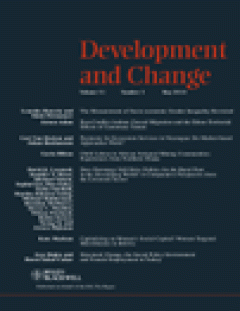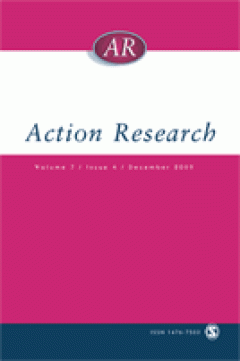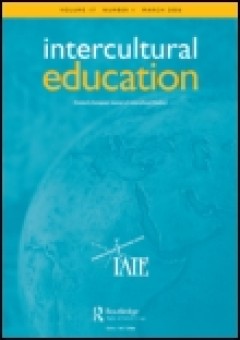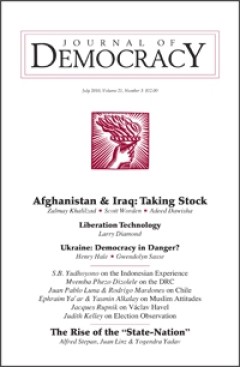Filter by

Capitalizing on Women's Social Capital? Women-Targeted Microfinance in Bolivia
Both social capital and microfinance are central to mainstream development interventions, and both are predicated on the need to recognize the importance of social factors in development. Microfinance institutions mobilize social capital in the form of a group guarantee, and aim to support the development of sustainable financial institutions and income generation. Women are targeted in part be…
- Edition
- Volume 41 Issue 3, May 2010. Pages 495 - 515
- ISBN/ISSN
- 0012155x
- Collation
- -
- Series Title
- Development and Change
- Call Number
- -

Structural Change, the Social Policy Environment and Female Employment in Turkey
Since the 1970s, a series of demand and supply related changes have led to significant labour market transformations which have brought about a sustained increase in female employment throughout the world. While similar transformations have also been underway in Turkey, the country appears to be one of the rare exceptions to worldwide trends. During the last two decades both female labour force…
- Edition
- Volume 41 Issue 3, May 2010. Pages 517 - 538
- ISBN/ISSN
- 0012155x
- Collation
- -
- Series Title
- Development and Change
- Call Number
- -

New action research techniques: Using Participatory Theatre with health care …
The use of various creative art forms in the research process is reflective of the turn towards interpretative practices that make visible certain aspects of the social world. Theatre, especially, has the capacity to convey meanings that pertain to the flux of social relationships. Reported in this paper is a particular use of theatre that is located in a history and tradition of liberatory soc…
- Edition
- Vol. 8 no. 2. June 2010. pp. 117-133
- ISBN/ISSN
- 14767503
- Collation
- -
- Series Title
- Action Research
- Call Number
- -

External Conversations: An unexpected discovery about the critical friend in …
This article is a scholarly reflection of a novice researcher conducting an action research investigation as a professional developer working with a group of elementary teachers. By the third analysis cycle, the researcher-practitioner became overwhelmed due to the amount and variety of qualitative data, and to the additional complexities caused when situational context needed to be considered.…
- Edition
- Vol. 8 no. 2. June 2010. pp. 135-152
- ISBN/ISSN
- 14767503
- Collation
- -
- Series Title
- Action Research
- Call Number
- -

Developing a practice-theory model in pre-service teacher education in Greece…
This paper deals with the use of action research in a postgraduate teacher education programme. The first part of the article presents the initial education of secondary teachers in Greece, as well as a postgraduate university programme that could be viewed as an alternative pre-service teacher education (PTE) programme, as implemented in a partnership between a tertiary education institution a…
- Edition
- Vol. 8 no. 2. June 2010. pp. 153-170
- ISBN/ISSN
- 14767503
- Collation
- -
- Series Title
- Action Research
- Call Number
- -

The utility of educational action research for emancipatory change
Much has been written about the potential of action research (AR) to advance social justice and emancipatory change. However, since its original promulgation in the 1940s and despite its increasing popularity and acceptance in many academic fields, AR in general, and educational AR in particular, appear to have fallen short of significantly advancing these ends, particularly in the industrializ…
- Edition
- Vol. 8 no. 2. June 2010. pp. 171-189
- ISBN/ISSN
- 14767503
- Collation
- -
- Series Title
- Action Research
- Call Number
- -

Fostering inclusivity through teaching and learning action research
In post-secondary curricula, the introduction of research paradigms that emphasize community inclusion and social action is increasingly valued by scholars. However, there is only a modest amount of scholarship regarding how the delivery of such material should be structured, or the challenges and/or successes with various course models. In this article the authors synthesize the existing liter…
- Edition
- Vol. 8 no. 2. June 2010. pp. 191-209
- ISBN/ISSN
- 14767503
- Collation
- -
- Series Title
- Action Research
- Call Number
- -

Developing human capital through a pragmatic oriented action research project…
The action research methodology used in this article is referred to as �intervention research�. In specific terms, it is called the Socio-Economic Approach to Management (SEAM). The SEAM approach is both participatory and collaborative. It is a pragmatic oriented action research methodology and it belongs to the French action research tradition with roots in the UK and the work of Tavistock Ins…
- Edition
- Vol. 8 no. 2. June 2010. pp. 211-232
- ISBN/ISSN
- 14767503
- Collation
- -
- Series Title
- Action Research
- Call Number
- -

The discourse on multicultural education in Finland: education for whom?
Finland is experiencing increased immigration and therefore increased cultural diversity in its schools. This paper examines the multicultural education discourse in Finland by analysing the national and municipal curricula for the comprehensive school, educational policy documents and teacher education curricula. The focus is on how multicultural education is talked about and whether it is aim…
- Edition
- Volume 21, Issue 2 April 2010 , pages 107 - 120
- ISBN/ISSN
- 14675986
- Collation
- -
- Series Title
- Intercultural Education
- Call Number
- -

Intercultural education in Sweden through the lenses of the national minoriti…
The aim of this paper is to discuss two perspectives in relation to intercultural education and diversity in Sweden. One of the perspectives concerns the historical and current situation of the five Swedish national minorities with a special focus on education. The second perspective is related to religious diversity and education, as connected to an increasingly democratic, plural and inclusiv…
- Edition
- Volume 21, Issue 2 April 2010 , pages 121 - 135
- ISBN/ISSN
- 14675986
- Collation
- -
- Series Title
- Intercultural Education
- Call Number
- -

Education of ethnic minority children in Denmark: monocultural hegemony and c…
This paper explores the dominant approach to education of ethnic minorities in Denmark. Using the concept of hegemony and the political-science distinction between monocultural and multicultural positions as approaches towards a situation of increasing linguistic, ethnic and cultural diversity, the paper shows how a monocultural approach has become hegemonic in policy initiatives and legal docu…
- Edition
- Volume 21, Issue 2 April 2010 , pages 137 - 151
- ISBN/ISSN
- 14675986
- Collation
- -
- Series Title
- Intercultural Education
- Call Number
- -

Multicultural education in Iceland: vision or reality?
In this paper, the development of educational policy and curricula in relation to the development of a multicultural society in Iceland are critically discussed. Neither policy nor national curriculum guides refer particularly to multicultural society, multicultural or intercultural education. Implementations of equity principles are not clear in the curriculum guides. These facts leave schools…
- Edition
- Volume 21, Issue 2 April 2010 , pages 153 - 167
- ISBN/ISSN
- 14675986
- Collation
- -
- Series Title
- Intercultural Education
- Call Number
- -

Literacy instruction and integration: the case of Norway
By focusing on different subsequently implemented strategies for literacy teaching in the Norwegian primary and lower secondary schools, this paper offers a historical overview of some important aspects of learning conditions for minority children. On this basis, the paper addresses the interrelationship between different strategies of literacy teaching and integration in a more general sense.
- Edition
- Volume 21, Issue 2 April 2010 , pages 169 - 181
- ISBN/ISSN
- 14675986
- Collation
- -
- Series Title
- Intercultural Education
- Call Number
- -

Afghanistan: An Election Gone Awry
The 2009 vote for the presidency and local councils was marred by fraud, provoking a political crisis and casting a deep shadow over upcoming parliamentary elections. The Afghan experience calls into question whether voting should occur before other essential reforms are in place.
- Edition
- Vol. 20, No 3, July 2010, pp. 11-25
- ISBN/ISSN
- 10455736
- Collation
- -
- Series Title
- Journal of Democracy
- Call Number
- -

The Democratic Instinct in the 21st Century
Democratization is never easy, smooth, or linear, but as Indonesia�s experience in building a multiparty and multiethnic democracy shows, it can succeed even under difficult and initially unpromising conditions.
- Edition
- Vol. 20, No. 3, July 2010, pp. 5-10
- ISBN/ISSN
- 10455736
- Collation
- -
- Series Title
- Journal of Democracy
- Call Number
- -

Iraq: A Vote against Sectarianism
Although many Iraqi parties continue to be organized along religious or ethnic lines, both the tone and the results of the 2010 parliamentary election campaign show that most Iraqi voters prefer a broader national agenda over narrow sectarian appeals.
- Edition
- Vol 20, No. 3, July 2010, pp. 26-40
- ISBN/ISSN
- 10455736
- Collation
- -
- Series Title
- Journal of Democracy
- Call Number
- -

Lessons from Afghanistan and Iraq
After almost ten years of complex and costly efforts to build democracy in these two countries, where do things stand? What lay behind the critical choices that shaped events in these places, and what are their current prospects for success?
- Edition
- Vol. 20, No. 3, July 2010, pp. 41-49
- ISBN/ISSN
- 10455736
- Collation
- -
- Series Title
- Journal of Democracy
- Call Number
- -

The Rise of “State-Nations”
Must every state be a nation and every nation a state? Or should we look instead to the example of countries such as India, where one state holds together a congeries of �national� groups and cultures in a single and wisely conceived federal republic?
- Edition
- Vol. 20, No. 3, July 2010, pp. 50-68
- ISBN/ISSN
- 10455736
- Collation
- -
- Series Title
- Journal of Democracy
- Call Number
- -

Liberation Technology
The Internet, mobile phones, and other forms of �liberation technology� enable citizens to express opinions, mobilize protests, and expand the horizons of freedom. Autocratic governments are also learning to master these technologies, however. Ultimately, the contest between democrats and autocrats will depend not just technology, but on political organization and strategy.
- Edition
- Vol. 20, No. 3, July 2010, pp. 69-83
- ISBN/ISSN
- 10455736
- Collation
- -
- Series Title
- Journal of Democracy
- Call Number
- -

The Role of Regionalism
Although Ukraine�s regional divisions are often thought to be detrimental to state-building and democratization, they have in fact been a source of strength and helped to prevent tilts to the political extremes.
- Edition
- Vol. 20, No 3, July 2010, pp. 99-106
- ISBN/ISSN
- 10455736
- Collation
- -
- Series Title
- Journal of Democracy
- Call Number
- -
 Computer Science, Information & General Works
Computer Science, Information & General Works  Philosophy & Psychology
Philosophy & Psychology  Religion
Religion  Social Sciences
Social Sciences  Language
Language  Pure Science
Pure Science  Applied Sciences
Applied Sciences  Art & Recreation
Art & Recreation  Literature
Literature  History & Geography
History & Geography